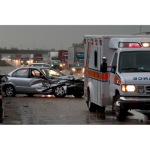We’re all familiar with the traffic cameras that are perched atop stoplight poles at intersections. They are seemingly present everywhere, quietly observing the ebb and flow of traffic traveling through cities. Many of us assume they record continuously to monitor traffic patterns or silently capture the chaos of intersection car accidents. However, the truth is more nuanced.
Contrary to popular belief, these traffic cameras provide live feed footage of intersections and often serve as silent sentinels. For those wondering, ‘Do traffic cameras record?’, the answer is that they typically do not video record and store footage of intersections unless prompted to do so.
The question of how long traffic camera footage is stored is important to understand, especially when it comes to incidents such as traffic accidents. In Florida, the Department of Transportation (FDOT) typically retains traffic camera footage for a period of 24 to 72 hours.
This means that the footage of an accident at an intersection may only be available for a short time after the event. As a result, it is unlikely that a personal injury lawyer in Naples would be able to obtain footage through a subpoena unless the incident occurred within this limited window.
A car accident lawyer can attest to the pivotal role these cameras can play in establishing fault and securing compensation for accident victims. However, it is not necessarily needed to prove fault or obtain compensation for intersection accidents in Florida.
Jump to:
- What Is The Purpose Of FDOT Traffic Cameras?
- Can A Red Light Camera Record An Intersection Accident?
- What Cameras Do Record Traffic Accidents?
- How A Personal Injury Lawyer In Naples Can Help
What Is The Purpose Of FDOT Traffic Cameras?
In Florida, the purpose of the traffic cameras that are stationed at the top of intersections differs from what many assume. While victims of automobile accidents often inquire with their personal injury attorneys about whether or not they can access the footage from these cameras to use as evidence, this is not necessarily an option. These cameras, distinct from red light cameras, don’t record retrievable footage for future use. They are owned and operated by the Florida Department of Transportation (FDOT), and primarily serve as traffic monitoring tools.
Positioned strategically on top of traffic lights, they are used to aid the smooth flow of traffic, providing real-time live streams of traffic that are utilized by traffic engineers, law enforcement agencies, as well as local municipalities and counties. Instead of recording and storing video for retrospective analysis, these cameras play a proactive role in improving traffic management and facilitating informed decision-making when planning transportation and law enforcement efforts.
Can A Red Light Camera Record An Intersection Accident?
Red light cameras, while commonly used for intersection surveillance, serve a specific function in enforcing traffic regulations rather than recording accidents. Many people wonder, “Do traffic cameras record continuously”? While they may capture a license plate, these cameras are only designed to capture a vehicle’s license plate when they cross the white line when the traffic signal indicates red. Essentially, they remain dormant until a red light violation occurs, and then they turn on to take a photo or video of the car committing a traffic violation.
Intersections equipped with these cameras may also have sensors embedded in the road, enabling customized adjustments to traffic light timings in response to traffic congestion. While the footage from red light cameras cannot be retrieved for evidentiary purposes in accident cases, knowing how to get traffic camera footage in Florida can be crucial for legal matters. Law enforcement and emergency responders can still promptly address any incidents or traffic emergencies at these intersections as they will be notified, ensuring swift medical attention and intervention when needed.
What Cameras Do Record Traffic Accidents?
While FDOT traffic cameras at intersections, including red light cameras, don’t typically record and store video footage or photographs of Florida car accidents, there are alternative types of cameras that could potentially capture such events.
Speed Trap Cameras
In June 2023, Florida authorized the use of speed cameras within school zones. They allow law enforcement to monitor and enforce speed limits without having an officer directly monitor the scene. While these cameras primarily target speeding violations within school zones, their presence could potentially lead to the recording of car accidents occurring within these zones if one of the vehicles was speeding.
Such footage would be invaluable in a personal injury case, especially considering the frequency of pedestrian and bicycle accidents near schools. These types of accidents often result in severe injuries. However, just like traffic and red light cameras, it is not a guarantee that the camera will record and store the footage, and logistical and legal barriers may hinder the accessibility of this footage, making the likelihood of obtaining it uncertain.
Despite the potential benefits, the feasibility of retrieving such recordings remains up in the air, highlighting the complexities surrounding the use of surveillance technology when trying to obtain compensation for injuries sustained in a car accident.
Surveillance Cameras
Surveillance cameras installed on residential or business properties can serve as valuable resources when trying to establish liability in Florida car accident cases. Typically oriented towards the front of the home, which may also be towards nearby roads, these cameras are strategically positioned on buildings and aimed outward.
Security cameras often operate either continuously or activate upon detecting motion, allowing them to capture footage during crucial moments, as long as they occur within their field of view. Although privately owned, contacting the owner directly to request access to any recorded footage is often met with a willingness to assist, especially if the footage can help determine who caused the accident in hit-and-run accidents.
However, it’s important to act swiftly or seek the assistance of a personal injury lawyer in Naples promptly, as this footage is frequently deleted relatively soon after being recorded. The invention of doorbell cameras, exemplified by brands like Ring and Nest, has significantly helped both criminal and civil law cases, highlighting the helpfulness of privately owned surveillance technology in contemporary legal contexts.
How A Personal Injury Lawyer In Naples Can Help
A personal injury lawyer in Naples can provide legal assistance following a car accident, regardless of whether footage from traffic cameras is available. Here’s how they can assist you:
- Investigation and Evidence Gathering — Personal injury lawyers have the resources and knowledge to conduct thorough investigations into the circumstances surrounding the accident, collecting evidence, including traffic camera footage if it is available.
- Legal Guidance and Advocacy — Lawyers can provide legal guidance tailored to your specific case, advising you on your rights and options for pursuing compensation for your injuries. They serve as strong advocates on your behalf when negotiating with insurance companies or in court.
- Negotiation and Settlement — Lawyers are skilled negotiators who can work to secure a fair settlement with insurance companies. They are there to spare you the stress of navigating complex negotiations on your own, ensuring you are not taken advantage of.
- Litigation Support — In cases where a settlement agreement cannot be reached, lawyers are prepared to take your case to court and represent your interests during litigation, providing you with the best chance of obtaining the compensation you deserve.
- Emotional Support — Dealing with the aftermath of a car accident in Florida can be emotionally challenging. Personal injury lawyers offer support and guidance throughout the process, helping you get through the legal complexities while providing reassurance and empathy while you recover from your injuries.




